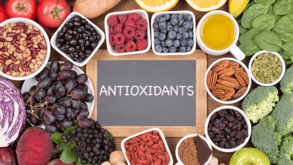Antioxidants have long been touted as disease-fighting molecules, and it's easy to assume that the more of them you eat, the healthier you will be. But research shows that larger doses can actually be harmful.
Antioxidants are nature's weapon against harmful molecules called "free radicals," which are continuously created by the body as cells do their jobs. These unstable molecules can damage our cells and cause diseases such as cancer as we age.
Some antioxidants are made by the body, while others — like beta-carotene from carrots, lycopene from tomatoes and polyphenols from grapes — come from a person's diet. All are thought to prevent and limit the cell damage, or oxidative stress, caused by free radicals.
But given all their benefits, is it possible to have too many antioxidants?
Research shows that people whose diets are full of antioxidant-rich fruits, vegetables and legumes tend to have a lower risk of cardiovascular disease, cancer and early death from any cause. So it's easy to think that upping your antioxidant intake — by taking supplements, for instance — would be beneficial. But compared with food, supplements make it easier to exceed the recommended doses of antioxidants, which can actually be harmful.
Side effects of high antioxidant doses range from mild to very serious. On the milder end, high amounts of beta-carotene are known to turn the skin yellow or orange, which is visually striking but not harmful, per se. Excessive vitamin C intake can lead to digestive issues, like diarrhea, nausea and abdominal cramps.
More seriously, high doses of beta-carotene may increase the risk of lung cancer and cardiovascular disease in individuals already at high risk for these diseases, such as current and former smokers and people who have been exposed to asbestos. There's also evidence from studies of animals and human tissue suggesting that antioxidants can encourage the growth and spread of some cancers.
In addition, high-dose vitamin E supplements have been shown to interact with certain medicines, such as aspirin, warfarin, tamoxifen and cyclosporine A. They've also been tied to an increased risk of early death in people with chronic disease.
These studies suggest that, yes, having excessive amounts of antioxidants can be bad for you — but why? One reason is that low amounts of free radicals can actually be helpful.
There is lots of evidence indicating that free radicals have beneficial roles in physiological processes. At low concentrations, free radicals help cells grow and are part of the body's defense mechanism against disease. They are also involved in the metabolism, or breakdown, of drugs and participate in cell-to-cell communication.
However, if too many antioxidants are consumed, these normal and essential processes can be disrupted, resulting in undesirable effects.
How can we make sure not to overdose on antioxidants? Skip the supplements, and stick to a healthy diet.
When someone eats a balanced diet that includes sufficient fruits and vegetables, the right amount of antioxidants will be consumed. Dietary supplements are rarely, if ever, needed, except in the long-term absence of an appropriate diet, or in some types of diseases.
Exercise is also important. The body is capable of generating its own antioxidants, and exercise increases this built-in antioxidant production in the muscles, heart and liver.
If you are considering an antioxidant supplement, discuss it with a health care professional. It's essential to be aware of the supplement's doses and how they align with your daily dietary intake, because overconsumption may lead to toxicity. It's also important to know if a supplement could interact with a medication you take.


